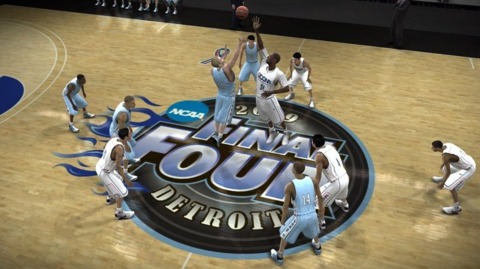Peter Moore reveals EA Sports gameplan
MI6 2009: Executive explains overhaul of Madden division to fit changing industry landscape, reveals 311 percent increase in online play.
SAN FRANCISCO--Last month, game developers from around the world descended on this city to attend the Game Developers Conference. That event was created to give the people who make games a chance to discuss emerging trends, share lessons learned, and network with colleagues. Today, the people who sell games did the exact same things at their own event in the heart of San Francisco.

Keynoting the Fourth Annual MI6 Game Marketing Conference was EA Sports president Peter Moore, who has supported the show since its 2006 inception and still holds a spot on its board of governors. Moore used the platform to discuss his efforts to reinvigorate the EA Sports brand and show off the latest fruit of those labors, EA Sports Active for the Wii.
Moore began his speech by recapping four key attributes EA Sports stood for before his arrival. First and foremost, the brand prided itself on authenticity (hence the "It's in the Game" slogan). He also emphasized the publisher's focus on innovation year in and year out, so gamers are "compelled" to get the new version of every game. Competition and lifestyle rounded out the package, with Moore highlighting online play, events, tournaments, and other promotions as ways to bring more gamers to EA Sports titles.
While Moore said all four of those things are still important, he acknowledged that the industry landscape has been changing since Konami's Dance Dance Revolution brought activity into the mix. Wii Sports pushed that trend further, and social games like EA Partners' and MTV Games' Rock Band further changed the industry, Moore noted. The problem is, those games generally pushed the industry away from EA Sports' core competencies and the four pillars the brand was built on.

While those trends may have presented challenges to EA Sports in particular, Moore said they were "tremendously empowering" for gamers in general. For the first time, titles like Wii Fit got across to the masses that games weren't just violent fare for adolescents; they could also be good for people.
Back to EA Sports' approach to the problem, Moore said the publisher turned its focus to five pillars, the first two of which were capturing core gamers and captivating the masses. While he acknowledged those two could seem contradictory on the surface, Moore stressed that it was possible to pursue both at once, creating an elasticity to the brand that leaves it in good shape however the industry changes.
The remaining three pillars were to globalize the company, to expand the EA Sports brand into new areas, and, most importantly, "to digitize the business." Moore said it was crucial to the company to use digital distribution to continually refresh the gaming experience for players, whether it's with premium downloadable content or regular roster updates. Sports were particularly well suited to the globalization approach, according to Moore.
"There's one thing about sports that no other genre enjoys," Moore pointed out. "I don't need to localize the games for you to understand how to play."

Moore then introduced a live demo of EA Sports' latest appeal to the masses, EA Sports Active. Moore's days of live demos are apparently behind him, as rather than risk another faux pas along the lines of his final E3 conference for Microsoft, the executive introduced a member of the EA Sports Active team to go through a short workout while he preached the game's virtues. (Moore does apparently play the game, because after his keynote address he credited the game with helping him lose 18 pounds.)
With the pitch for casual gamers out of the way, Moore explained the approach to draw in the core consumer. The first point of emphasis was on improving quality, giving players a reason to buy the game again year after year. Innovation also plays into that. Moore pointed to the Dynamic DNA feature of NBA Live 09 as particularly appealing to hardcore fans. The Dynamic DNA system updates the game every night to reflect players' real-world tendencies and stats.
"It is the future not only of sports games, but of games," Moore said, adding that it will be built into more of the company's games in the future.
Moore said all that was made possible by online gaming. He pointed to EA's own stats, which showed a 311 percent jump in online gamers from EA Sports' 08 series of games to its 09 entries. He added that 60 to 70 percent of all EA Sports gamers take their titles online, with "huge upticks" in that number whenever the company releases substantial downloadable content.
Connecting with consumers offline was another point of change for Moore. He talked about the variety of lifestyle events EA Sports holds, from hosting 6,000 gamers at the Rose Bowl for a Madden promotional event to touring EA Sports Challenge events around the country. Moore acknowledged that EA Sports is the object of a lot of scorn from core gamers, and he talked about efforts to change that perception.
One part of Moore's solution was to use self-deprecating humor, as EA Sports did with the virally disseminated Tiger Woods 09 glitch ad. Another aspect is talking directly to consumers, which Moore has done through his own blog.

On the topic of keeping the experience fresh, Moore pointed to the recent release of NHL 3-on-3 Arcade and the recent NCAA March Madness bracket. He noted that the main games still need to come out at the beginning of each season, but downloadable games and add-ons are a way to capitalize on the excitement surrounding the post-season tournaments of each sport.
Yet another way that the digitization of the industry is helping EA is with free-to-play business models. Moore mentioned how popular free-to-play massively multiplayer games are in Asia (Korea particularly) and talked about EA's attempt to capitalize on those markets. While the company is comfortable distributing games like FIFA Online 2 and NBA Street Homecourt to the free-to-play markets at the moment, Moore said EA is looking at ways to roll them out in the West without cannibalizing the existing core businesses.
Swinging to the opposite end of the spectrum, Moore talked about expanding the EA Sports brand into purely analog endeavors. Whether it's with EA Sports-branded restaurants or sporting equipment, Moore talked about the efforts to put the name into entirely new areas. The first such expansion was the virtual playbook, which transposed Madden 09 graphics onto studio sets in some NFL broadcasts last year in order to show audiences the way the plays develop after the snap.
"This is a very different world than it was three years ago about how you go to market," Moore said, adding, "This is about talking to [consumers] every single day, showing them things every single day as [the game's] in development. It's about making them feel part of the process instead of the victim of the process, which they often do."
Got a news tip or want to contact us directly? Email news@gamespot.com
Join the conversation